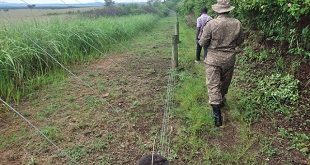
There is high incidence of root mealy bugs and coffee berry disease especially in Elgon region
Kampala, Uganda | THE INDEPENDENT | Uganda’s coffee exports generated a record US$876.4million in revenues for the just concluded 2021/2022 coffee year that ended on September.30. This represents a 39% increase in revenues compared to the previous year despite a decline in export volumes.
Latest statistics from the state-owned Uganda Coffee Development Authority (UCDA) shows that the East African nation exported 5.85 million 60kgs bags of coffee for last year’s fiscal year compared to 6.5million 60kg bags exported in the previous year.
“The decrease in exports was mainly attributed to lower yields this year that were characterized by drought in most regions,” UCDA states in the monthly report for September this year.
“This led to a shorter main harvest season in Central and Eastern regions and also reduced harvests from Greater Masaka and South-Western regions.”
Most of the country’s coffee exports were destined to Italy, Sudan, Germany, India and Morocco. Others are Tunisia, Samalia, Egypt, Libya and Kenya.
Uganda has since 2014 recorded steady growth in coffee export earnings driven by the government’s deliberate step to boost coffee production.
In the 2014/15 coffee year, Uganda exported 3.24 million 60kgs bags of coffee worth US$403million.
UCDA adds that though September was characterized by near normal to normal rains that favored coffee planting across many regions, not many farmers planted due to limited access to free coffee seedlings as a result of the changes in coffee distribution policy through the Parish Development Model (PDM).
Also, UCDA and National Coffee Research Institute (NaCORI) conducted pest and disease surveillance surveys that indicated a high incidence of root mealy bugs and coffee berry disease especially in Elgon region.
UCDA says the Red Blister Disease and the Black Coffee Twig Borer (BCTB) were prevalent in almost all Robusta growing Regions.
Beyond Uganda
Elsewhere across the East African region, Ethiopia, Kenya and Rwanda have also recorded a sharp increase in coffee export revenues.
Ethiopia, which is known as the origin of Arabica coffee, exported 300,000 metric tons of coffee during the last 12 months, eventually generating US1.4bn in revenue.
Rwanda’s coffee export volumes amounted to over 15 million kgs and generated over US$75.5 million for the 2021/2022 coffee year. The 23% increase in coffee revenues from July 2021 to June 2022 in comparison with the same period of 2021, is attributed to good prices registered in this period. Rwanda’s coffee has been trading at an average price of US$4.58/kg against US$3.62/kg of 2021.
Similarly, Kenya’s coffee earnings in the 11 months to August 2022 increased by US$81 million boosted by higher volumes and better prices in the international market.
Data from the Nairobi Coffee Exchange (NCE) shows returns in the period hit US$210 million compared to US$$129 million in the 11 months to August 2021, according to Kenya’s Business Daily.
Global outlook
Latest projection from the United States Department of Agriculture, Coffee: World Markets and Trade reports indicates that global coffee production for 2022/23 is forecast to reach 175 million bags which is an increase of 7.8 million bags from the previous year as Brazil’s Arabica crop enters the year of the biennial production cycle.
The after effect of the Brazilian drought and frost which occurred in the previous year on its 2022/23 harvest though has not been quantified yet. If the damage is high, global production forecast might be revised downwards.
Global consumption is expected to increase by 1.81 million bags to 167 million with the largest increase in European Union, United States, Japan and Brazil. World exports are forecast to be higher on gains in Brazil and Indonesia.
Ending stocks are expected to be 2.1 million bags higher than last year to be 34.7 million bags following last year’s sharp drawdown.
****
 The Independent Uganda: You get the Truth we Pay the Price
The Independent Uganda: You get the Truth we Pay the Price



